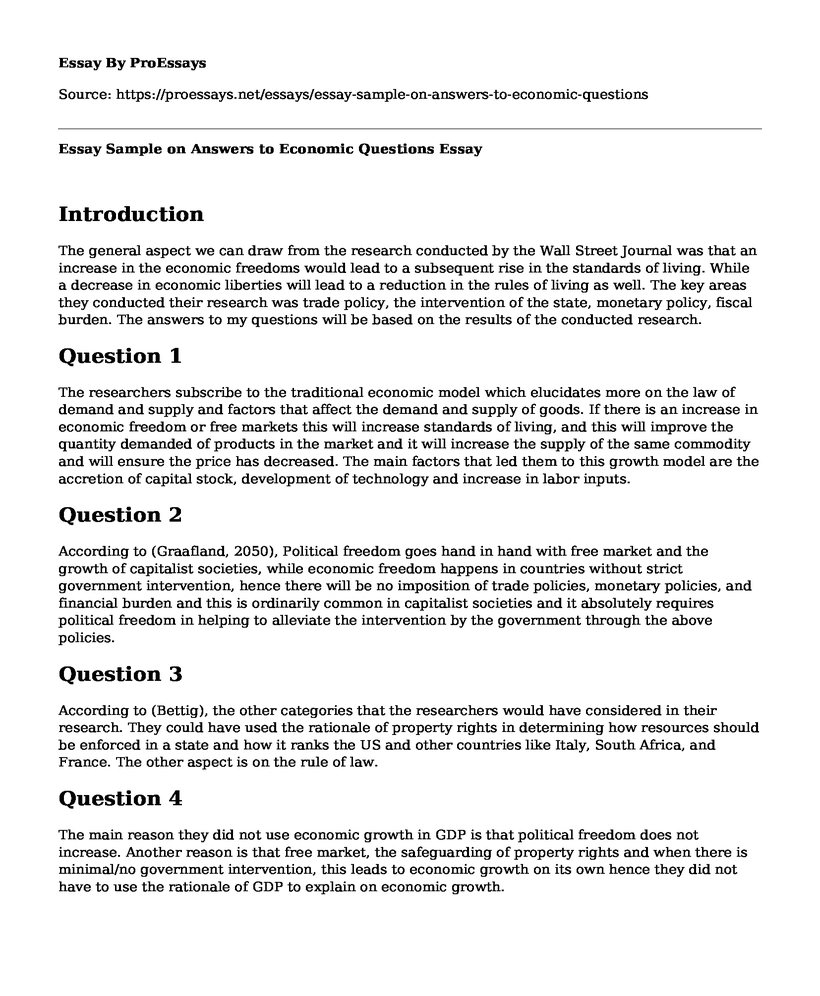Introduction
The general aspect we can draw from the research conducted by the Wall Street Journal was that an increase in the economic freedoms would lead to a subsequent rise in the standards of living. While a decrease in economic liberties will lead to a reduction in the rules of living as well. The key areas they conducted their research was trade policy, the intervention of the state, monetary policy, fiscal burden. The answers to my questions will be based on the results of the conducted research.
Question 1
The researchers subscribe to the traditional economic model which elucidates more on the law of demand and supply and factors that affect the demand and supply of goods. If there is an increase in economic freedom or free markets this will increase standards of living, and this will improve the quantity demanded of products in the market and it will increase the supply of the same commodity and will ensure the price has decreased. The main factors that led them to this growth model are the accretion of capital stock, development of technology and increase in labor inputs.
Question 2
According to (Graafland, 2050), Political freedom goes hand in hand with free market and the growth of capitalist societies, while economic freedom happens in countries without strict government intervention, hence there will be no imposition of trade policies, monetary policies, and financial burden and this is ordinarily common in capitalist societies and it absolutely requires political freedom in helping to alleviate the intervention by the government through the above policies.
Question 3
According to (Bettig), the other categories that the researchers would have considered in their research. They could have used the rationale of property rights in determining how resources should be enforced in a state and how it ranks the US and other countries like Italy, South Africa, and France. The other aspect is on the rule of law.
Question 4
The main reason they did not use economic growth in GDP is that political freedom does not increase. Another reason is that free market, the safeguarding of property rights and when there is minimal/no government intervention, this leads to economic growth on its own hence they did not have to use the rationale of GDP to explain on economic growth.
Question 5
US does not embrace free market economy since the government of the US always plays a role in the economic affairs of the nation. The government still controls the prices of goods in the market; it imposes on monetary policies and most of the properties are owned by the state. This is why there has been a drop in terms of economic growth in the rationale of the free market.
Question 6
The researcher was biased as they only concentrated on free markets which were not in favor with the economy of the United States, and ironically the researchers come from the United States.
Works Cited
Graafland, Johan, and Bjorn Lous. "Economic freedom, income inequality and life satisfaction in OECD Countries." Journal of Happiness Studies 19.7 (2018): 2071-2093.
Bettig, Ronald V. Copyrighting culture: The political economy of intellectual property. Routledge, 2018.
Cite this page
Essay Sample on Answers to Economic Questions. (2022, Nov 11). Retrieved from https://proessays.net/essays/essay-sample-on-answers-to-economic-questions
If you are the original author of this essay and no longer wish to have it published on the ProEssays website, please click below to request its removal:
- Importance of Becoming a Global Citizen Essay
- Buddhism and Modern Capitalist Development in Thailand Essay
- Amazon: A Premier Employer Despite Challenges in HR Recruiting - Essay Sample
- Calculating Unemployment - Essay Sample
- Essay Sample on Monopoly: Market Structure & Natural Resource Control
- COVID-19: Showing Social Safety Net's Weaknesses & Low-Wage Worker Struggles - Essay Sample
- Developing Employability Skills: A Self-Assessment for the Role of Voluntary Witness Support Worker







